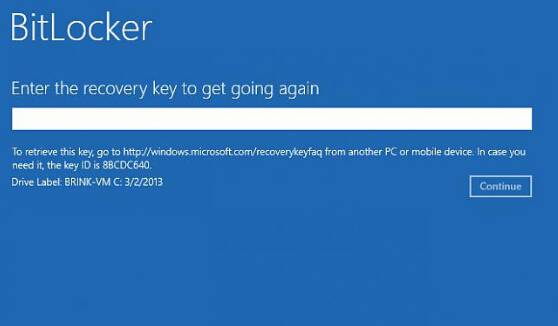If you have forgotten your BitLocker recovery key, you will not be able to access the data on your drive. However, there are a few ways that you can try to bypass BitLocker and access your data.
One method is to use a software tool called M3 Data Recovery. This software can help you recover data from drives that have been encrypted with BitLocker. Another method is to use a professional data recovery service. These services can often decrypt drives that have been encrypted with BitLocker, although they may be expensive.
How do I get out of BitLocker recovery without key?
How do I bypass BitLocker in Windows 10?
There is no official way to bypass BitLocker in Windows 10. However, there are a few third-party tools that claim to be able to do this. We cannot verify the efficacy of these tools, and therefore cannot recommend them.
What happens if you skip BitLocker recovery key?
If you skip the BitLocker recovery key, you will not be able to access your data.
How do I force BitLocker to unlock?
There is no way to force BitLocker to unlock. If you have forgotten your password or recovery key, you will not be able to access the data on your drive.
Can I skip BitLocker recovery?
If you have BitLocker Drive Encryption enabled on your computer, you may be prompted for a recovery key if the computer detects a change in startup components. This can happen when you restart your computer after installing certain types of updates or drivers, or if you make changes to the hard drive configuration (such as adding an external hard drive).
You can skip the BitLocker recovery process by pressing the F1 key when prompted. However, if you do this, your computer will not be protected by BitLocker and anyone will be able to access your data. We recommend that you go through the recovery process so that your computer remains secure.
How do I find my lost BitLocker recovery key?
There are a few ways you can go about finding your lost BitLocker recovery key, depending on how and where you lost it. If you have a Microsoft account linked to your Windows 10 device, you can go to the Microsoft support website and sign in with your account credentials. From there, you should be able to retrieve your recovery key. If you don’t have a Microsoft account, or if you’re unable to retrieve your key from the support website, you’ll need to contact Microsoft support for further assistance.
Can BitLocker be cracked?
There is no one-size-fits-all answer to this question, as the level of security provided by BitLocker depends on a number of factors, including the strength of the encryption key used. However, it is generally accepted that BitLocker provides a high level of security and that it would be very difficult for an attacker to crack the encryption without access to the key.
How do I disable BitLocker in BIOS?
There is not a universal answer to this question, as the process for disabling BitLocker will vary depending on the make and model of your BIOS. However, you can typically disable BitLocker by entering the BIOS settings menu and navigating to the security settings. From there, you should be able to find an option to disable BitLocker (or encrypting drive).
How do I permanently remove BitLocker?
If you would like to permanently remove BitLocker, you will need to decrypt the drive using the BitLocker management tools. For more information on how to do this, please see the Microsoft documentation here: https://docs.microsoft.com/en-us/windows/security/information-protection/bitlocker/bitlocker-how-to-use#manage-decrypting
Is there any software to unlock BitLocker?
There are a few software programs that claim to be able to unlock BitLocker, but we cannot verify if they work or not. We recommend contacting Microsoft support for help with unlocking your BitLocker drive.
{“@context”:”https://schema.org”,”@type”:”FAQPage”,”mainEntity”:[{“@type”:”Question”,”name”:”How do I bypass BitLocker in Windows 10?”,”acceptedAnswer”:{“@type”:”Answer”,”text”:”nnThere is no official way to bypass BitLocker in Windows 10. However, there are a few third-party tools that claim to be able to do this. We cannot verify the efficacy of these tools, and therefore cannot recommend them.”}},{“@type”:”Question”,”name”:”What happens if you skip BitLocker recovery key?”,”acceptedAnswer”:{“@type”:”Answer”,”text”:”nnIf you skip the BitLocker recovery key, you will not be able to access your data.”}},{“@type”:”Question”,”name”:”How do I force BitLocker to unlock?”,”acceptedAnswer”:{“@type”:”Answer”,”text”:”nnThere is no way to force BitLocker to unlock. If you have forgotten your password or recovery key, you will not be able to access the data on your drive.”}},{“@type”:”Question”,”name”:”Can I skip BitLocker recovery?”,”acceptedAnswer”:{“@type”:”Answer”,”text”:”nnIf you have BitLocker Drive Encryption enabled on your computer, you may be prompted for a recovery key if the computer detects a change in startup components. This can happen when you restart your computer after installing certain types of updates or drivers, or if you make changes to the hard drive configuration (such as adding an external hard drive).nnYou can skip the BitLocker recovery process by pressing the F1 key when prompted. However, if you do this, your computer will not be protected by BitLocker and anyone will be able to access your data. We recommend that you go through the recovery process so that your computer remains secure.”}},{“@type”:”Question”,”name”:”How do I find my lost BitLocker recovery key?”,”acceptedAnswer”:{“@type”:”Answer”,”text”:”nnThere are a few ways you can go about finding your lost BitLocker recovery key, depending on how and where you lost it. If you have a Microsoft account linked to your Windows 10 device, you can go to the Microsoft support website and sign in with your account credentials. From there, you should be able to retrieve your recovery key. If you don’t have a Microsoft account, or if you’re unable to retrieve your key from the support website, you’ll need to contact Microsoft support for further assistance.”}},{“@type”:”Question”,”name”:”Can BitLocker be cracked?”,”acceptedAnswer”:{“@type”:”Answer”,”text”:”nnThere is no one-size-fits-all answer to this question, as the level of security provided by BitLocker depends on a number of factors, including the strength of the encryption key used. However, it is generally accepted that BitLocker provides a high level of security and that it would be very difficult for an attacker to crack the encryption without access to the key.”}},{“@type”:”Question”,”name”:”How do I disable BitLocker in BIOS?”,”acceptedAnswer”:{“@type”:”Answer”,”text”:”nnThere is not a universal answer to this question, as the process for disabling BitLocker will vary depending on the make and model of your BIOS. However, you can typically disable BitLocker by entering the BIOS settings menu and navigating to the security settings. From there, you should be able to find an option to disable BitLocker (or encrypting drive).”}},{“@type”:”Question”,”name”:”How do I permanently remove BitLocker?”,”acceptedAnswer”:{“@type”:”Answer”,”text”:”nnIf you would like to permanently remove BitLocker, you will need to decrypt the drive using the BitLocker management tools. For more information on how to do this, please see the Microsoft documentation here: https://docs.microsoft.com/en-us/windows/security/information-protection/bitlocker/bitlocker-how-to-use#manage-decrypting”}},{“@type”:”Question”,”name”:”Is there any software to unlock BitLocker?”,”acceptedAnswer”:{“@type”:”Answer”,”text”:”nnThere are a few software programs that claim to be able to unlock BitLocker, but we cannot verify if they work or not. We recommend contacting Microsoft support for help with unlocking your BitLocker drive.”}}]}







